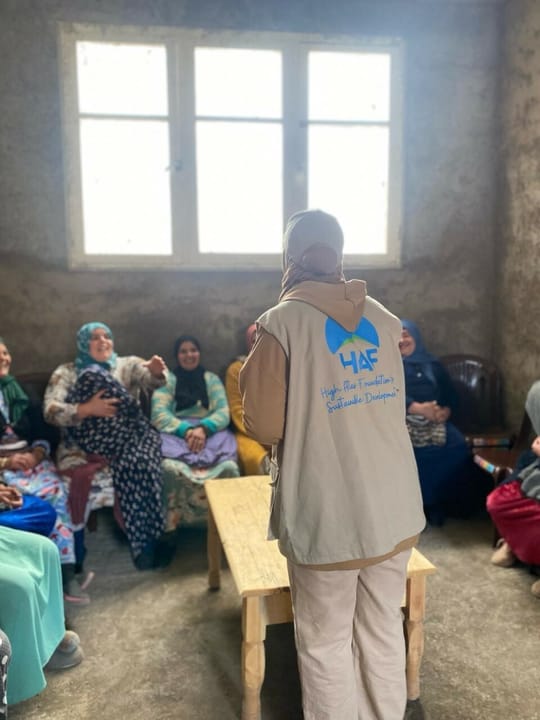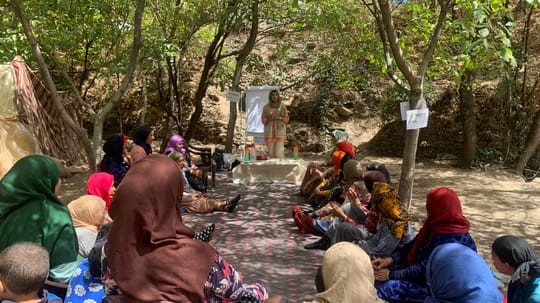In the first week of March 2024, two teams from the High Atlas Foundation moved to conduct two four-day psychosocial support workshops to support healing and rebuilding after the 2023 earthquake, benefiting fifty women and fifty-one children. They used the HAF program, which seeks to both share with them their pain and anxiety and lessen the impact of the tragedy, all while giving them the chance to talk, discuss, and express whatever is going on inside of them—whether it be what the earthquake caused or what they experienced prior to that.
We arrived in the Ait Harb community on the first day following a protracted and challenging journey. In front of us was a sizable gathering of women and kids, some of them were holding traditional musical instruments from their culture. They began to beat and play the drums as soon as they saw us. The others were chanting after the one who was singing. This whole thing was a happy indication that we had arrived at their roundabout. Despite the fact that they knew little about the visit's aim and objectives, the women greeted us with ululations and singing, showing their happiness at our presence and wearing a soft grin that seemed to be concealing a big secret.

Women of Ait Harb village, Ouirgane commune, Al Haouz province, one of the villages damaged by the horrific Al Haouz earthquake, welcoming the HAF team (photo by HAF)
The two teams got out of the car, and we all headed in the women’s direction, clapping our hands to show how thrilled we were to be welcomed. Until we arrived at the headquarters, the location of the workshop, the women continued to play. The women were there and prepared to comprehend the importance of our arrival, and the scenery was stunning. Everything was tidy and well-organized.
The women took their seats, and we started the workshop a few minutes after they finished playing and introducing themselves. I chose to introduce myself to the attendees and teach them about the organization and what it does, particularly the psychological support program with Project HOPE, which is the reason for our visit, and wished them a happy welcome. The women in attendance were looking at each other and whispering things that I could not understand at first as I spoke. However, I later learned that the women's confusion and suspicion stemmed from their realization that HAF had given them food supplies, clothing, and mattresses during the initial months following the earthquake. Next came the process of selecting, one by one, the women who would attend the workshop.
Following my verification that I had removed every obstacle that would have prevented me from communicating with the guests, I started a conversation with them about the earthquake night by asking them seemingly straightforward questions about the goals of the workshop. I was curious about their reactions and emotions throughout the earthquake.
The women's expressions changed from laughing to sadness and pain as soon as I asked my final questions. I listened to the women as they spoke about that terrible night and was astounded by what I saw. I only saw extreme exhaustion and a melancholy that is sometimes hard to put into words.
Then, I began to realize that someone who laughs a lot often conceals a lot of painful memories, and I understood that those women had experienced difficult times during the earthquake, which caused the smile to vanish from their faces as if it had never been there. Their abrupt cessation of laughter, the photo I saw when I got there, and their kind and heartfelt welcome served as my inspiration for the workshop. I wanted to restore their smiles, ease their sadness and anxiety, and make those four days exclusively for them—a time for them to talk, argue, debate, share experiences, and grow from one another.
By the end of the first day, or more accurately, the end of my talk with them, I was able to discern from their words, their manner of speaking, and their body language that night their deep anxiety and load of troubles. The residents of this community were afraid for one another in spite of all of this anxiety and fear. In order to feel comfortable and to know that they would be together no matter what happened, they helped, stood, and walked hand in hand till they slept together in one location. "Because strength exists in unity." That night, this was their credo. Not everything that we observe is true. It's terrifying what's hidden. We just pretend to chuckle and attempt to go on, but we are often fooled by appearances.
The arduous trip toward women became easier on the second day, maybe because our bodies adjusted to the local air and our desire to meet women overshadowed the bumpy, narrow path. The greeting, the kindness, and the grin remained the same, but this time, we were taken aback when our names appeared in the chants and melodies that the mountains' echoed, enhanced in splendor and beauty.
That day, I learned that the heart still needs an ear, and the wound still needs balm. For these reasons, I gave the attendees more time to let out all of their worries and groans to relieve themselves on the one hand, and to help me, via a series of straightforward questions, determine which support is best for each of them on the other. All of this is done in a loving and hopeful environment while keeping in mind the conventions of appropriate speech and listening.
These women were greeted and bid farewell with singing and ululations every day. For us, this amounted to psychological support. Not only did we give support, but we also received support.
Before the workshop began, the women would arrive and wait for me to arrive so that we could meet in that room and shut the door. We would begin the day with a breathing exercise and meditation, where the women would use their breath to remove all the negative energy they carried within.
Additionally, they closed their eyes and began to dream and imagine. While doing this, a few of them go on trips in their mind. The women visit the locations they love to see or see using only their imagination. Some of them only see lovely and joyful things, and others see themselves with their loved ones and kids since they are the source of their happiness, a comforting psychological activity for them. Subsequently, we engage in discussions on various subjects that pique their interest and assign various tasks based on the subject matter covered.
Compared to the first day, the last three days were distinct. The women started to adjust and spoke with ease, occasionally crying and occasionally laughing. They started to exhibit changes in their behaviors, facial expressions, and other aspects of themselves. Now that the session is coming to a conclusion, both the beneficiaries and I are having the hardest day. A day where we bid each other farewell with grace and tears, appreciating everyone's time, work, dedication, focus, and involvement. She was dancing, singing, and playing her ringtone.
